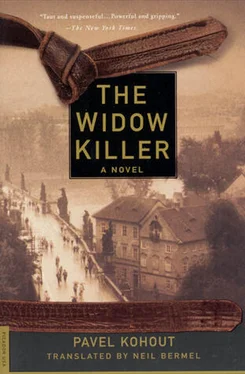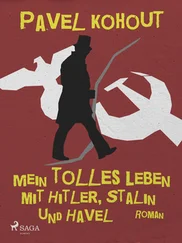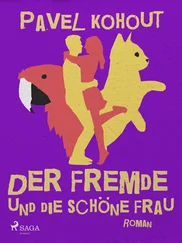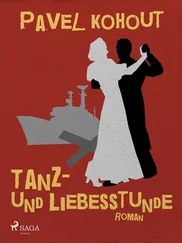“Lie down, Jan,” the driver insisted solicitously. “We ran over some glass shards; we’re changing the wheel.”
By the time they finished, he had come around and remembered everything. And when he realized they were in another police car, taking him to have his dressings changed properly, he stopped them immediately.
“We have to arrest him!”
“Jan,” Litera cautioned, “it might have been your imagination after that bang you took. I didn’t notice him.”
Morava halted; yes, after all, he’d just seen his mother and Jitka… but his detective’s memory rebelled.
“It was him! Rypl and his gang. And they’re probably still there; turn around, we have to go back right away.”
“You could get blood poisoning.”
“If he gets away from me again, I’ll have soul poisoning!”
Seeing that he was resolved to return on foot if necessary, they obeyed him.
They were too late; the gang was gone, but from the barricaders’ stories and the descriptions of the foursome they realized Morava had been right. Strengthened by the addition of the machine gunner, the suspected Ryplites had headed up toward Pankrác in a Mercedes with Berlin plates as soon as it was confirmed the SS were on the defensive.
Morava instantly set out after them.
The square by the Pankrác court building, where two tanks were burning, proffered an unbelievable image of Czech and German brotherhood. The soldiers in Wehrmacht uniforms were, of course, the infamous Russians of General Vlasov. Their thick Slavic accents were ample proof for the Praguers, who had just lived through a day of horrors and celebrated them as liberators in their hour of need. Thanks to Beran and Buback, Morava knew these ovations would only deepen the soldiers’ despair, since nothing now could save them. One of them was playing a wild melody on the accordion while the others danced a bravura display. They wore the faces of guests at their own funeral.
Morava caught these images in passing. All his senses were focused on his prey. He soon realized that they could go no farther without Rypl’s picture, and sent the new driver off for another batch of portraits from Bartolom  jská.
jská.
“If anyone’s at the department, bring him along as well,” Litera suggested. “Matlák’s sure to be there; he’s a crack shot. We can’t go after them barehanded. And if there are any decent German submachine guns lying around…”
Morava acceded, and because there was a first-aid ambulance a few paces along, Litera coaxed him into letting them have a look. He was glad in the end; the unsightly bullet wound, which had removed the skin, had dried. Soon, a large bandage had replaced the turban so similar to Brunát’s. Then he began combing the streets again, stubbornly convinced that Rypl would come into his own in exactly this sort of anarchy.
Confusion reigned on the square and the surrounding streets: Explosions of joy at surviving the day and perhaps even the whole war mingled with laments for lost loved ones. There were rows of cellars the SS had emptied with hand grenades. Volunteers carried the disfigured corpses out into the unrelenting rain and laid them temporarily on canvasses in front of the buildings. The victims were predominantly women and children.
Then a murmur rippled through the populace. A group of rebels wearing RG armbands, all with trophy weapons, marched down the middle of the thoroughfare. In their midst was a small crowd of German civilians, mainly women and children. In one hand the Germans carried suitcases and bundles, as much as each could hold; the other hand was raised above their heads. As their exhaustion grew they shifted hands more and more often. The Czech onlookers left their dead in front of the houses and realigned themselves along the procession route. Two columns of frosty silence greeted the parade of pale faces.
What do I feel toward these Germans, Morava wondered, and was suddenly surprised to find: nothing. The innocent rain-drenched victims on tarpaulins ruled out regret. But neither could he feel hate; these were defenseless and horrified people paying for what were by and large the sins of others. Most of all, he felt like packing every one of them — even those who were born here — off to the ruins of their ancestral homeland. Germany had unleashed this hell with their blessing, and he never wanted to see or hear them again.
Suddenly one of the Czechs, to judge by her expression half crazed with grief, slipped through the escort and fell upon a tall German woman with a blond braid, who even in her humbled state reminded Morava of the Nazi ideal of Germanic beauty as extolled in films and posters. As if lashing out at all Germans through this one, she scratched the woman’s face with her nails and lacerated her skin. The victim cried out in pain, dropped her overflowing bag, and covered her face with both hands; two little girls beside her burst into tears.
Instantly two escorts were there; they pulled the attacker off and tried to return her as carefully as possible to the sidewalk, but just then pure hatred erupted. There was a forest of menacing fists, insults, and threats, gobs of spit flying over the guard’s heads and onto them as well. Morava could see lunacy in many of the onlookers’ eyes and realized he might have behaved just like this after Jitka’s death, if his task had not imposed an iron self-discipline on him.
When stones started to fly, the escort commander drew his pistol and fired into the air. This drew a deafening whistle of contempt from the crowd; the threatening guardsmen began to fire as well, and a massacre seemed inevitable. Morava quickly formulated a plan.
“Litera,” he shouted, “you take the back!”
Meanwhile, he pushed toward the front of the escort, where the commander was, and made himself heard over the restless crowd.
“Clear the way! In the name of the law! Offenders will be prosecuted! Clear the way for the law!”
Surprisingly, the presence of two uniformed policemen had the desired effect; the more levelheaded members of the throng helped calm the distraught ones. The German woman obediently hefted her baggage again. Seeing the bloody slashes on her face and the sobbing children helped the crowd’s fever die down. The people returned to their dead, walking awkwardly past the attacker, who was now crying bitterly on another woman’s shoulder. Morava sensed that for many of them — him included — the need for retribution clashed with the fear of becoming just like the men who so recently murdered their loved ones.
This brought him back to his original question: What would follow this war with the Germans? It was a wonderfully seductive picture: Czech would be the only language of Bohemia and Moravia, and the time bomb that had twice destroyed the Czech state would disappear.
However, it implied a new danger. Antonín Rypl was a Czech too— and now a national avenger. The killer’s latest move unfortunately proved that despite his insane depravity, he was gifted with extraordinary intelligence and intuition. Morava longed for a quick meeting with Beran to try out his newest hypothesis:
Rypl had discarded his old identity upon finding the unknown corpse and was founding his own armed force. With their help, he would compel goodwill toward himself on the street and in the new revolutionary organs through exceptional brutality against Germans, thereby cementing his new persona.
Instead of just “Good work, Morava,” he wanted to hear that Police Commissioners Beran and Brunát understood this terrible threat to the future of the free republic and would mobilize all the police reserves, even in the current situation. Once the country was cleansed of Germans, they could not allow a new bunch of scoundrels to occupy it just because they spoke the local language.
Читать дальше

 jská.
jská.










